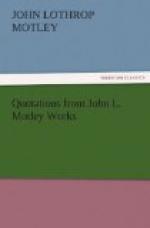Halcyon days of ban, book and candle
Heresy was a plant of early growth in the Netherlands
In Holland, the clergy had neither influence nor seats
Invented such Christian formulas as these (a curse)
July 1st, two Augustine monks were burned at Brussels
King of Zion to be pinched to death with red-hot tongs
Labored under the disadvantage of never having existed
Learn to tremble as little at priestcraft as at swordcraft
Many greedy priests, of lower rank, had turned shop-keepers
No one can testify but a householder
Not of the stuff of which martyrs are made (Erasmus)
Nowhere was the persecution of heretics more relentless
Obstinate, of both sexes, to be burned
One golden grain of wit into a sheet of infinite platitude
Pardon for crimes already committed, or about to be committed
Pardon for murder, if not by poison, was cheaper
Paying their passage through, purgatory
Poisoning, for example, was absolved for eleven ducats
Pope and emperor maintain both positions with equal logic
Power to read and write helped the clergy to much wealth
Readiness to strike and bleed at any moment in her cause
Repentant females to be buried alive
Repentant males to be executed with the sword
Sale of absolutions was the source of large fortunes to the priests
Same conjury over ignorant baron and cowardly hind
Scoffing at the ceremonies and sacraments of the Church
Sharpened the punishment for reading the scriptures in private
Slavery was both voluntary and compulsory
Soldier of the cross was free upon his return
St. Peter’s dome rising a little nearer to the clouds
Tanchelyn
The bad Duke of Burgundy, Philip surnamed “the Good,”
The egg had been laid by Erasmus, hatched by Luther
The vivifying becomes afterwards the dissolving principle
Thousands of burned heretics had not made a single convert
Thus Hand-werpen, hand-throwing, became Antwerp
To prefer poverty to the wealth attendant upon trade
Tranquillity of despotism to the turbulence of freedom
Villagers, or villeins
Heresy was a plant of early growth in the Netherlands
In Holland, the clergy had neither influence nor seats
Invented such Christian formulas as these (a curse)
July 1st, two Augustine monks were burned at Brussels
King of Zion to be pinched to death with red-hot tongs
Labored under the disadvantage of never having existed
Learn to tremble as little at priestcraft as at swordcraft
Many greedy priests, of lower rank, had turned shop-keepers
No one can testify but a householder
Not of the stuff of which martyrs are made (Erasmus)
Nowhere was the persecution of heretics more relentless
Obstinate, of both sexes, to be burned
One golden grain of wit into a sheet of infinite platitude
Pardon for crimes already committed, or about to be committed
Pardon for murder, if not by poison, was cheaper
Paying their passage through, purgatory
Poisoning, for example, was absolved for eleven ducats
Pope and emperor maintain both positions with equal logic
Power to read and write helped the clergy to much wealth
Readiness to strike and bleed at any moment in her cause
Repentant females to be buried alive
Repentant males to be executed with the sword
Sale of absolutions was the source of large fortunes to the priests
Same conjury over ignorant baron and cowardly hind
Scoffing at the ceremonies and sacraments of the Church
Sharpened the punishment for reading the scriptures in private
Slavery was both voluntary and compulsory
Soldier of the cross was free upon his return
St. Peter’s dome rising a little nearer to the clouds
Tanchelyn
The bad Duke of Burgundy, Philip surnamed “the Good,”
The egg had been laid by Erasmus, hatched by Luther
The vivifying becomes afterwards the dissolving principle
Thousands of burned heretics had not made a single convert
Thus Hand-werpen, hand-throwing, became Antwerp
To prefer poverty to the wealth attendant upon trade
Tranquillity of despotism to the turbulence of freedom
Villagers, or villeins
RISE OF THE DUTCH REPUBLIC, 1555 by Motley [#3][jm03v10.txt]4803
Burned, strangled, beheaded, or buried alive (100,000)
Despot by birth and inclination (Charles V.)
Endure every hardship but hunger
Gallant and ill-fated Lamoral Egmont
He knew men, especially he knew their weaknesses
His imagination may have assisted his memory in the
task
Little grievances would sometimes inflame more than
vast
Often much tyranny in democracy
Planted the inquisition in the Netherlands




